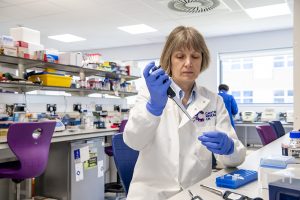An engineered antibody, designed by a scientist now based at the Centre for Cancer Immunology, has shown it could help treat people with severe autoimmune diseases and also in the diagnostic imaging of cancer.

Pioneering research by Professor Sally Ward identified the role of FcRn as a key receptor involved in the long persistence and tissue penetration of antibodies of the IgG class in the human body. In healthy individuals, antibodies recognise and destroy pathogens such as bacteria and viruses. However, sometimes antibodies can recognise self-components in the body and cause severe autoimmune diseases such as myasthenia gravis. In addition, because antibodies can bind to specific proteins on the surfaces of cells, they can be used as imaging agents to detect tumours.
In around 2005, the Ward-Ober laboratory designed an engineered antibody to block binding of IgG to FcRn. This blocking results in the antibodies being degraded following entry into cells and lowers IgG levels in the body. The FcRn blocker was licensed to the global immunology company, argenx, and they have developed it as efgartigimod.
Argenx, conducted a randomized, double-blind, placebo-controlled, multi-centre, global trial evaluating the safety and efficacy of efgartigimod in patients with generalized myasthenia gravis, a chronic, autoimmune, neuromuscular condition that causes debilitating muscle weakness in different parts of the body. Recent topline results, published by argenx, showed that 63.1% of patients responded to efgartigimod compared with 14.1% on placebo. Based on these promising results, it is expected that efgartigimod will be launched in the US in 2021.
Professor WardŌĆÖs research which led to the development of efgartigimod took place at UT Southwestern Medical Center in Texas. Now at the Centre for Cancer Immunology, Professor Ward said: ŌĆ£The recent results from argenx are very encouraging for the use of efgartigimod as a therapeutic. In addition to treating autoimmunity, efgartigimod may also have applications as an agent to reduce background during diagnostic imaging of tumours with labelled antibodies.ŌĆØ